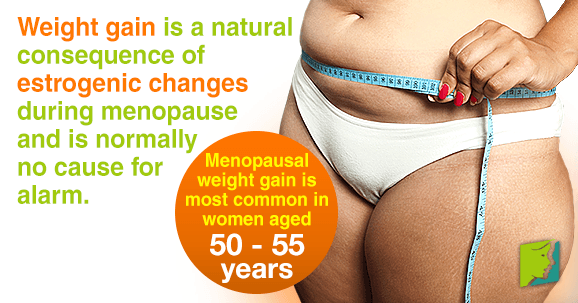Weight gain is often seen as a symptom of menopause, but menopause is not always to blame for weight gain. Lowering levels of estrogen are responsible for a redistribution of body fat, but many other factors related to aging and lifestyle are usually responsible for weight gain around this time.
What Is Estrogen?
Estrogen is the primary female sex hormone, which is produced mainly in the ovaries, and in order to function effectively, it has to work with the right amounts of progesterone. As a woman approaches menopause, fluctuations in the levels of these two hormones are what causes menopause symptoms.
What Does Less Estrogen Mean for the Body?
As the body prepares for its next stage in life, it begins to produce less estrogen. However, far from disappearing all at once, or in a consistent decline until the end, hormones in the body connected with reproduction (estrogen being one of the most important) begin to ebb and flow, and this can go on for a few years. Hormones are connected to a lot of important functions in the body, so decreasing estrogen levels can cause:
- Hot flashes
- Night sweats
- Vaginal dryness
- Mood swings
- Loss of libido
Causes of Weight Gain in Menopausal Women
Weight gain in women going through menopause can be caused by a variety of factors, but it is not always apparent why a menopausal woman is gaining weight. Many women become frustrated when lifestyles they had when they were younger now cause them to gain weight, or have other indications of declining health, such as high blood pressure and cholesterol.
Weight gain can be caused by genetics - if your parents gained weight when they were around your age, this could explain some of your weight gain. Stress, changes in diet, and less exercise can also cause weight gain. The main factor causing weight gain in aging women is that as the body ages, muscle mass diminishes and body fat increases. Because muscles use up more calories, you may feel your metabolism slow down, which can lead to weight gain.
Estrogen and Weight Gain
Menopause's main impact on a woman's weight is not changing how much she weighs, but changing where she tends to accumulate fat. During and after menopause, a woman's body fat tends to redistribute and spread around her abdomen, hips, and thighs.
The best approach is by eating and exercising adequately which will help you live a healthy lifestyle and help you lose weight. If you need help finding a plan to lose weight, it may be a good idea to consult a doctor or dietician, who can give you more specialized advice that fits you and your lifestyle.
Sources
- National Institutes of Health. (2011). Menopause: MedlinePlus Medical Encyclopedia. Retrieved July 11, 2014, from http://www.nlm.nih.gov/medlineplus/ency/article/000894.htm
- Mayo Clinic Staff. (2013). Menopause weight gain: Stop the middle age spread. Retrieved from http://www.mayoclinic.org/healthy-lifestyle/womens-health/in-depth/menopause-weight-gain/art-20046058
- Northrup, C. (2006). The Wisdom of Menopause. New York: Bantam Dell.
- University of Maryland Medical Center. (2014). Different types of weight gain. Retrieved July 11, 2014, from http://umm.edu/health/medical/reports/images/different-types-of-weight-gain
- University of Maryland Medical Center. (2013). Menopause. Retrieved July 11, 2014, from http://umm.edu/health/medical/reports/articles/menopause




